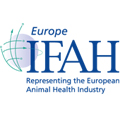 IFAH-Europe welcomes the European Medicines Agency’s and the European Food Safety Agency’s summary conclusions of their joint opinion on EU measures to reduce the need to use antimicrobials in animal husbandry as an important acknowledgement that there is no perfect farming system and that multifaceted approaches, taking into account local livestock production practices, are key to successful strategies for tackling AMR.
IFAH-Europe welcomes the European Medicines Agency’s and the European Food Safety Agency’s summary conclusions of their joint opinion on EU measures to reduce the need to use antimicrobials in animal husbandry as an important acknowledgement that there is no perfect farming system and that multifaceted approaches, taking into account local livestock production practices, are key to successful strategies for tackling AMR.
Providing an initial commentary on the report, IFAH-Europe Secretary General Roxane Feller said, “This report addresses important questions on livestock production in Europe and highlights that further research is needed in key areas. The animal health industry in Europe has been a long-term supporter of monitoring the development of resistant bacteria through a Target Pathogen Monitoring Programme (TPMP) and surveillance of antibiotic use through European Surveillance of Veterinary Antimicrobial Consumption (ESVAC). Greater consistency and harmonisation in reporting will improve transparency of antibiotic use in farming and help to develop better targeted and refined recommendations for the responsible use of these important tools for treating animal disease.”

A strong supporter of the view that antibiotics should be used ‘as little as possible, as much as necessary’, the animal health industry urges caution when envisaging reduction targets. With antimicrobial resistance being one of the world’s most pressing one health issues, limiting their use to a minimum is part of the solution, but we need to ensure that any reduction of use is done so on a case-by-case basis, and in a sustainable way that protects animal health. We support the call for risk management measures that are proportionate and relevant to the risk assessment. Guidance must continue to be science-led and transparent to sustain a predictable regulatory environment that will create a conducive environment for innovation. We also support a scientific review of options to phase out preventive use in livestock, provided there is no negative impact on animal health, and welcome actions to improve biosecurity to prevent disease occurrence.
“Veterinary medicines play a key role in ensuring optimal hygiene measures on farms and the use of vaccines offer preventive protection. Use of diagnostics and other innovative technologies can also assist with earlier disease detection for a more targeted health management. We are keen to provide support, when called upon by the authorities, for guidance required in terms of education for both veterinarians and farmers on the responsible use of all animal health products and the advertising thereof”, concluded Ms. Feller.
February 10, 2017 - IFAH Europe


